
The Metal Element
In Traditional Chinese Medicine (TCM), the world is explained through the lens of the Five Elements: Wood, Fire, Earth, Metal, and Water. Each element is associated with a season, in addition to various aspects of the body, emotions, organs, and so on. The Metal element represents autumn, structure, and the ability to refine and let go, both in nature and within the human body.
The Metal element embodies qualities of clarity, refinement, and structure, drawing inspiration from the nature of metal itself. In nature, metals are strong, sharp, and durable, yet they also possess the ability to be molded and refined, transitioning from raw material to something polished and purposeful. This dual nature—of both rigidity and adaptability—mirrors how the Metal element functions within the body and mind.
The Metal element also offers a powerful metaphor for both physical and emotional health. Just as metal tools need sharpening and care, our Lungs, Large Intestines, and emotional resilience must be nurtured to maintain balance. Understanding Metal’s role can help in cultivating strength, resilience, and the ability to release what no longer serves us—creating space for growth and renewal.
Key Characteristics of Metal’s Nature
Structure and Organization. Metal provides structure, much like how bones support the body or how the Lungs give shape to the breath. This structure manifests not just physically but mentally and emotionally, helping individuals create boundaries, maintain order, and uphold principles. In life, this is seen in the ability to create routines, make decisions, and approach tasks with clarity and precision. Are you maintaining clear boundaries in your life? Is your thinking clear, organized, and precise?
Refinement and Purification. Just as metal can be smelted and purified, the Metal element is associated with the process of refining and letting go. It governs the Large Intestine’s role in eliminating waste and the Lungs’ role in refining the breath and distributing vital Qi. Emotionally, this refinement involves releasing what is no longer needed—whether it’s old ideas, stagnant emotions, or unhealthy attachments. Are you ready to let go of what no longer serves you (in whatever form that may be)?
Strength in Flexibility. Though Metal is strong, it is not unyielding. It possesses a balance between strength and flexibility. In TCM, a balanced Metal element allows one to be firm in their beliefs and values, while also adapting to life’s changes. When flexible, Metal can bend under pressure without breaking, demonstrating resilience and endurance. Do you feel strong, resilient and flexible, both physically and emotionally?
Connection to the Cosmos. Metal is associated with the heavens and the concept of pure air. The Lungs, as the primary Metal organ, breathe in the essence of the sky, bringing celestial energy into the body. This connection reflects a sense of openness and inspiration, allowing individuals to draw wisdom and insight from a higher, more expansive perspective. Do you feel connected to a higher purpose or sense of inspiration?
Connection to Grief. The emotion associated with Metal is grief. Just as autumn is a time of letting go, Metal governs the process of release—whether it’s emotions, experiences, or physical waste. When balanced, Metal helps us process and release grief healthily. However, an imbalance may lead to either excessive grief or emotional numbness. Are you able to release and process difficult emotions such as grief, rather than holding on to them?
Metal’s Role in Transition and Transformation
In the natural world, Metal is connected to fall, a time of transition when the earth prepares for rest after the growth of spring and summer. Leaves fall from the trees, marking a time of harvest and release. This cyclical shedding is essential for making space for new life in the future.
Similarly, Metal governs transformation within the human body and mind. It encourages the shedding of what is unnecessary—whether physical waste through the Large Intestine or emotional baggage through the processing of grief. In this way, Metal represents the ability to move forward, transformed and renewed by life’s experiences.
In essence, the Metal element reflects a dynamic blend of strength, clarity, and transformation, serving as a vital force in both nature and human life.
Signs of Metal Element Imbalance
- Excess Metal: When Metal is excessive, individuals may experience rigid thinking, difficulty letting go of emotions or ideas, and become overly critical or perfectionistic. Physical symptoms might include dry skin, respiratory issues, or constipation.
- Deficient Metal: A deficiency in Metal can manifest as weak boundaries, lack of discipline, or issues related to the immune system, such as frequent colds or respiratory problems. Emotionally, individuals may have trouble processing grief or may feel disconnected from their own sense of purpose.
How to Balance the Metal Element
- Breathing Exercises: Deep, conscious breathing helps strengthen the Lungs and boost Qi circulation. Practices like Qigong or pranayama (breath control) can harmonize the Metal element.
- Herbal Medicine and Foods: In TCM, certain herbs and foods support the Metal element. White foods like onions, garlic, radishes, and pears are often recommended. Herbs that strengthen the Lungs include astragalus and ginseng.
- Emotional Release: Since Metal is connected to grief, it’s important to allow oneself to process and release difficult emotions. Journaling, meditation, or seeking therapy can assist in emotional cleansing.
- Acupuncture: Acupuncture treatments can specifically target the Lung and Large Intestine meridians, helping to restore balance within the Metal element.
Photo by Karolina Kaboompics from Pexels







